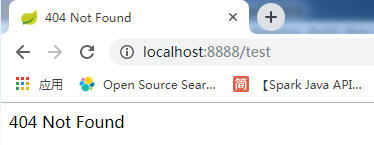Springboot项目统一异常处理
Springboot项目统一异常处理
一.接口返回值封装
1. 定义Result对象,作为通用返回结果封装
2. 定义CodeMsg对象,作为通用状态码和消息封装
二.定义全局异常类
三.定义异常处理类
四.特殊处理404异常
五.测试使用效果
一.接口返回值封装
基于目前大多数项目都采用前后端分离架构,所以后端接口统一返回值封装是比较重要的,便于前后端对接与统一处理。当然按各自项目约定实现即可,思路大同小异,下面是我的实现方式,仅供参考
1. 定义Result对象,作为通用返回结果封装
/**
*
@filename Result
*
*
@description 通用返回结果封装
*
* @author llspace
* @version 1.0
* @since 2019/6/17 11:55
**/
@Data
public class Result {
private int code;
private String msg;
private T data;
/**
* 成功时候的调用
*/
public static Result success(T data) {
return new Result(data);
}
/**
* 失败时候的调用
*/
public static Result error(CodeMsg cm) {
return new Result(cm);
}
private Result(T data) {
this.code = 0;
this.msg = "success";
this.data = data;
}
private Result(CodeMsg cm) {
if (cm == null) {
return;
}
this.code = cm.getCode();
this.msg = cm.getMsg();
}
}
2. 定义CodeMsg对象,作为通用状态码和消息封装
/**
*
@filename CodeMsg
*
*
@description 通用状态码和消息封装
*
* @author llspace
* @version 1.0
* @since 2019/6/17 11:57
**/
@Data
public class CodeMsg {
//自定义状态码
private int code;
//消息信息
private String msg;
//通用异常 4001XX
public static CodeMsg SUCCESS = new CodeMsg(0, "success");
public static CodeMsg SERVER_ERROR = new CodeMsg(500100, "服务端异常");
//模块1 4002XX
//模块2 4003XX
//模块3 4004XX
private CodeMsg(int code, String msg) {
this.code = code;
this.msg = msg;
}
public CodeMsg fillArgs(Object... args) {
int code = this.code;
String message = String.format(this.msg, args);
return new CodeMsg(code, message);
}
}
二.定义全局异常类
基于上面封装的CodeMsg实现GlobalException定义,异常继承RuntimeException
/**
*
@filename GlobalException
*
*
@description 全局异常信息
*
* @author llspace
* @version 1.0
* @since 2019/6/20 18:05
**/
@Data
public class GlobalException extends RuntimeException {
private static final long serialVersionUID = 1L;
private CodeMsg codeMsg;
public GlobalException(CodeMsg codeMsg) {
super(codeMsg.toString());
this.codeMsg = codeMsg;
}
}
三.定义异常处理类
@RestControllerAdvice作用等同于@ResponseBody加上@ControllerAdvice,会在所有带有@Controller或者@RestController注解的类上生效,还可以使用basePackages参数配置指定异常处理类生效的包
/**
*
@filename GlobalExceptionHandler
*
*
@description 全局异常处理类
*
* @author llspace
* @version 1.0
* @since 2019/6/20 18:07
**/
@RestControllerAdvice
public class GlobalExceptionHandler {
@ExceptionHandler(value = Exception.class)
public Result exceptionHandler(HttpServletRequest request, Exception e){
e.printStackTrace();
if(e instanceof GlobalException) {
GlobalException exception = (GlobalException) e;
return Result.error(exception.getCodeMsg());
}else if(e instanceof BindException) {
BindException ex = (BindException) e;
List errors = ex.getAllErrors();
ObjectError error = errors.get(0);
String msg = error.getDefaultMessage();
return Result.error(CodeMsg.BIND_ERROR.fillArgs(msg));
}else {无锡妇科医院哪家好 http://mobile.xasgyy.net/
return Result.error(CodeMsg.SERVER_ERROR);
}
}
四.特殊处理404异常
spring boot默认不会抛出404异常(NoHandlerFoundException),所以在ControllerAdvice中捕获不到该异常,导致404总是跳过ContollerAdvice,直接显示ErrorController的错误页。需要改变配置,让404错误抛出异常(NoHandlerFoundException),这样便可在ControllerAdvice中捕获此异常。
如果是restful项目改变配置即可实现捕获上述异常,在application.yml中添加:
spring:
mvc:
throw-exception-if-no-handler-found: true
resources:
add-mappings: false
注意:添加了如上配置会造成项目静态资源访问异常, 如果不是restful的项目这样配置就会有问题,所以就需要采用其他方式来处理了, 可以参考如下处理方法
如果是带静态资源的项目我们要如何来处理404异常呢?
断点下BasicErrorController类,查看下源码可知,errorHtml()方法默认会返回一个new ModelAndView(“error”, model),所以其实在classpath:/templates下自定义一个error.html即可,这样springboot默认的404错误就跳转到了自己项目下的error页面了,这种处理比较简单,如果想更好的封装错误页面,建议自己实现ErrorController接口,或者继承AbstractErrorController / BasicErrorController类来实现,当然前提是删除掉配置文件中上述的两个配置
五.测试使用效果
至此,统一异常处理就实现了,如下使用,
if(loginVO == null) {
throw new GlobalException(CodeMsg.SERVER_ERROR);
}
这样会抛出异常如下:
GlobalException(codeMsg=CodeMsg(code=500100, msg=服务端异常))
如果是404异常会跳项目自定义的error页面

个人实现,仅供参考,有兴趣的小伙伴自己动手尝试吧!


